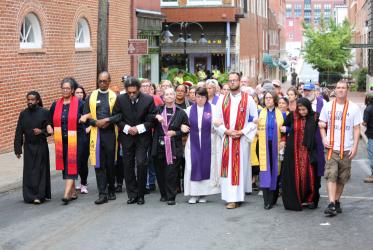The new Permanent Forum will have its first session on 5-8 December. It is an advisory body to the Human Rights Council, and will be a consultative mechanism for people of African descent and other relevant stakeholders as well as a platform for improving the safety and quality of life and livelihoods of people of African descent.
Rev. Jennifer S. Leath, a WCC central committee member from the African Methodist Episcopal Church, moderated the webinar at what she described as a “momentous time.” She opened the discussion with a moment of acknowledgment.
“I invite us to just observe a moment of silence at this time to acknowledge and to ensure our spirits pour liberations for those who have been lost, who have gone ahead, and whose spirits walk with us and inspire and motivate and direct us, as we continue this quest toward justice and toward the realization of full rights and acknowledgement of the complete humanity of one another, each of us siblings.”
Regarding the 2001 Durban World Conference Against Racism, Rev. Dr Iva Carruthers, executive director of the Samuel DeWitt Proctor Conference, explained that the United States’ “intent was to marginalize from the beginning,” the conference, and the Sept. 11 terrorist attacks three days after only exacerbated the marginalization of the conference’s outcomes.
Later in the discussion, she stressed the central role played by media in the current changing landscape of the movement as opposed to 20 years ago, and added that “there is a hierarchy of human values, according to which some are more valuable than others, manifested in different ways in a changing landscape that is grounded in technologies around artificial intelligence, genetics and concentrated wealth.”
Marilia A. Schüller, from the Methodist Church of Brazil, and former WCC program executive in the Program to Combat Racism, recalled the Durban Conference as “a wonderful experience for us as an ecumenical family to be together and to share our experiences and our understanding of racism in our context.” She later explained that “56% of the population in Brazil is of African descent. Yet, most of them experience the realities of marginalisation, ‘favellisation,’ poverty, malnutrition, joblessness, low income jobs, etc. Recently, Brazil started discussing affirmative actions for African descendants, Indigenous communities and other minorities to have access to the education system, and was confronted with strong resistance. Reparations is still at initial stages of discussions.”
WCC president from North America Rev. Dr Angelique Walker-Smith noted that “21 years after the Durban Conference, we are still at that moment of advocating for the principles and for the vision that is stated in the Durban Declaration and Program of Action (DDPA). The declaration gives us a platform, a roadmap in order to energise, document and acknowledge the consensus that was built, to pull us together for this historic moment.”
When asked why it took so long for the Permanent Forum to be created, and building on a question about the importance of looking back at history, Sushil Raj shared that “the Durban Declaration stresses the importance of the truth of history: who writes that history and from which vantage point. History written by those in power, those who oppress, is what has led to inter generational deprivation, to the place we are with disproportional effects on People of African and others. That also explains the exclusion of people from structures of power, also in the international machinery, including the United Nations, where a lot of what was negotiated in the past was negotiated by those in power. That combined with the politics of how bodies are established, and the negotiations, contributed in the delay of the establishment of the Permanent Forum.”
On the role churches can play in the work of this Forum in challenging manifestations of systemic racism, Rev. Lamont Wells, Evangelical Lutheran Church in America, noting that it was important to him that his church has defined racism as a sin, stressed the importance of “increasing the level of education and engagement of processes such as this new Permanent Forum. The church has done a lot of work in « acknowledging the complicity with slavery, creating study guides, having a deep review of our constitution and policies, established a study on reparations, and more. A lot of work was poured in our understanding of how we’ve treated each other, and connecting them to these human rights principles that are part of the Permanent Forum’s objectives."
“Mindful of the global momentum following the tragic killing of George Floyd in 2020, and the 20th anniversary of the Durban Conference and its Declaration and Program of Action, the WCC organised this webinar, offered as a virtual side event, in preparation for the forthcoming historic first session of the newly created Permanent Forum,” noted Segma Asfaw, WCC/CCIA staff
In the concluding remarks, Carruthers reminded us that “as Saint Augustine taught us, the daughters of hope were both anger and courage. Here we are with both: holy rage."







